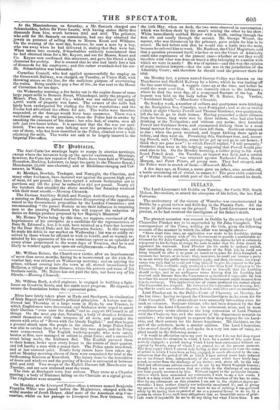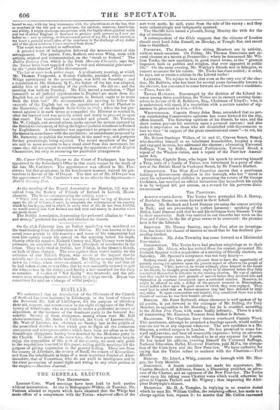IRELAND.
The Lord-Lieutenant left Dublin on Tuesday, for Castle Hill, South Molten, Devonshire, to attend the obsequies of his father, the late Earl Fortescue.
The anniversary of the victory of Waterloo was commemorated in Dublin by a grand review and field-day in the Phcenix Park. All the troops in garrison were on the ground. The Lord-Lieutenant was not present, as he had received the intelligence of his father's death.
The greatest sensation was created in Dublin by the news that Lord Chancellor Plunket was to be superseded by Sir John Campbell. The correspondent of the Times, writing on the 18th, gives the following acconnt of the manner in which the affair was brought about-
" Some short time since, an application was made to his Lordship, stating that it was the anxious wish of the Government to provide a comfortable re- tirement for Sir John Campbell, and requesting him, unless he felt it extremely repugnant to his feelings, to resign the seals in order that Sir John should be appointed his successor. Lord Plunket (to his credit be spoken) replied, that considering the eminence and character of the Irish bar, he could not bring himself to offer it so great an insult as to place Sir John Campbell, a common .law lawyer, at its head ; that, moreover, he could not become a party to an act which the public most consider a job; and that, therefore, his repug- nance was such that he could not bring himself to give his consent to the pro- position. This creditable reply produced a letter from Lord Ebrington to the Chancellor, requesting, as a personal favour to himself, that his Lordship. should resign, and in no ambiguous terms hinting that his Lordship had received such favours from the Government as rendered it impossible for him to refuse his assent to any accommodation the Government might demand from him in exchange. This application has of course produced the desired object. The Chancellor has resigned. Re forwarded his resignation last evening, feel- ing that he could not, without disgrace, hold the seals after such an intimation."
Lord Plunket sat in the Dublin Court of Chancery on Monday, for the last time; having resigned the Chancellorship to make room for Sir John Campbell. The proceedings were unusually interesting even for such an occasion. Sergeant Greene, who had been deputed by the Bar to address the Lord Chancellor on his retirement, arose, and in most complimentary terms alluded to the long connexion of Lord Plunket with the Chancery bar, and the suavity of his deportment towards its members ; who now begged to express their deep respect for his Lord- ship, and their anxiety for his future happiness. Mr. Goddard, on the part of the solicitors, made a similar address. The Lord Chancellor, who seemed deeply affected, and spoke in a very low tone of voice, re- plied nearly in the following terms- " It would be affectation upon my part to say that I do not feel deep regret at retiring from the situation in which I have for a period of fifty years been. activelyengaged; a period during which I have been surrounded without ex- ception by friends, many of whom I see around me at the present moment. The deep regret which I cannot help feeling at that retirement from the scene of action in which I have been so long engaged, is much alleviated by the con- sciousness that the period of life at which I have arrived must have induced me at no distant time, independently of the events which have lately hap- pened, to retire from the discharge of my duties ; and, above all, by the very kind and affectionate address conveyed to me by my friend Sergeant Greene; though I am not unconscious that my ability in the discharge of my duties has been greatly overrated by him. Without regard to the particular circum- stances which have occasioned my retirement, I wish to say a few words. I think it a duty which I owe to myself and to the members of the bar, to state, that for my retirement on this occasion I am not in the slightest degree an- swerable: I have neither directly nor indirectly sanctioned it ; and in giving my assent to the proposal which was made to me of retiring, I was governed solely by its having been requested or me as a personal favour to do so, by a person to whom I owe such deep obligations that an irresistible sense of grati- tude made it impossible for me to do any thing but what I have done. I ant. bound to say, with my long intercourse with the iii2actitioners at the bar, that as members of the bar and as gentlemen, for candour, courtesy, knowledge, and ability., I might challenge competition with the highly-distinguished bench and bar of either England cr Scotland to produce such persons as I now see before mo : and in retiring, at this advanced period of my life, I shall cherish in my heart a grateful recollection of the assistance in the discharge of my duties and of the great kindness I have received from them."
The court was crowded to suffocation.
A general burst of indignation followed the announcement of this arrangement. The papers, Tory, Radical, and even Whig, teem with articles, original and communicated, on the "insult to Ireland." The -Dublin Evening Post, which is the Irish Morning Chronicle, says that the Tories have been supplied with "a real and substantial grievance" by the "gross blunder" of the Government. The bar at once took active steps. A preliminary meeting, at which Mr. Thomas Fitzgerald, a Roman Catholic, presided, while several Whigs participated in the proceedings, was held on Saturday ; and a requisition to Mr. Dickson, Q. C., the father of the bar, was adopted, asking him to call a meeting of the profession. He did so ; and the meeting was held on Tuesday. Mr. Ellis moved a resolution, "That inasmuch as all judicial appointments in England are made from the English bar, so all judicial appointments in Ireland ought to be made from the Irish bar." He recommended the meeting to follow the example of the English bar on the appointment of Lord Plunket to the Mastership of the English Rolls Court in 1S27; when the bar pro- tested against it in such terms as compelled the Minister to rescind it, after the learned lord was actually robed and ready to proceed to open that court. The resolution was seconded and passed. Mr. Torrens, Mr. W. Cullagh, and several others, spoke against the system pursued by the British Government, of filling the highest judicial situations in Ireland by Englishmen. A Committee was appointed to prepare an address to the Queen in accordance with the resolution ; an amendment proposed by Mr. liattersby, to publish the resolution in the usual way, and postpone further proceedings, being rejected. The senior members of the bar are said in some accounts to have stood aloof from this movement, be- cause they did not concur in condemning the appointment of all English Chancellors, but only in censuring the particular arrangement.
Mr. Carew O'Dwyer, Filacer to the Court of Exchequer, has been appointed to the Secondary's Office in that court, vacant by the death of the late Mr. Carthrew. The appointment was offered to Mr. Fitz- simon ; but that gentleman, in the handsomest manner, waived his pre- tensions in favour of Mr. O'Dwyer. The first act of Mr. O'Dwyer was the appointment of Mr. Carthrew's son to an office in the department.— Dublin Evening Post.
At the meeting of the Repeal Association on Monday, 35/. was re- ceived from the Society of Friends of Ireland in Lowell, Massa- chusetts. The letter accompanying the subsidy says- " While with an earnestness and fervency of heart we beg of Heaven to ,spare the life of O'Connell until he completes the redemption of his country "which he has begun, and to which in every trial of life he has been faithful, we would remind him that Ireland can find men and money in America when she needs them."
The Dublin Association, deprecating the awkward allusion to "men and money," pocketed the cash, and thanked the donors.
On the 27th February last, an Italian music-boy was murdered on the road leading from Ratlsfarnham to Dublin. He was known to have saved some pounds in this country ; and some of his companions had seen him openly count his money on the morning before his death. Shortly after the murder, Richard Cooney and Mary Cooney were taken prisoners, on suspicion of having been principals er accessories in the crime. They were tried at Dublin, last Friday, in the Queen's Bench, on both of these charges. The case against them rested mainly on the evidence of one Patrick Bryan, who swore at the inquest that he actually saw them commit the murder. But Bryan so completely broke down on Friday, when cross-examined, admitting in the end that all he had before sworn to was false, that he was summarily ordered to quit the witness-box by the Judge ; and hardly a fact remained for the Jury to consider. A verdict of "Not Guilty" was returned ; and the pri- soners were triumphantly escorted home by a large crowd. Bryan was committed for trial on a charge of wilful perjury.



























 Previous page
Previous page